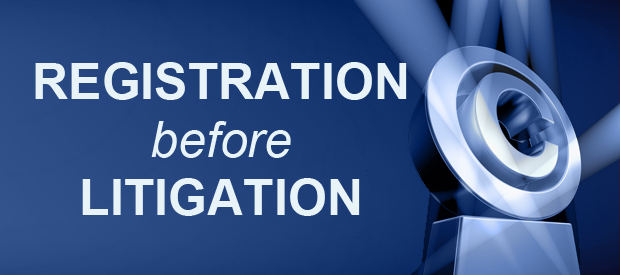SCOTUS: No Copyright Registration, No Infringement Lawsuit

The wheels of government turn slowly to the detriment of copyright owners, according to a unanimous opinion delivered by U.S. Supreme Court Justice Ruth Bader Ginsberg, in Fourth Estate Public Benefit Corporation v. Wall-Street.com.
Petitioner Fourth Estate licensed journalistic works to Wall-Street.com, a financial news website, on a subscription basis. When Wall-Street canceled the license agreement, it failed to remove articles sourced from Fourth Estate from its website.
Fourth Estate applied for copyright registration and prior to obtaining certificates of registration, sued Wall-Street.com for copyright infringement for the unauthorized continued use of the articles.
Under Section 102(a) of the 1976 Copyright Act, an author of a work has exclusive rights to the work as soon as it is created. If there is infringement, the Copyright Act allows the copyright owner to initiate a civil action. Before pursuing an infringement claim in court, however, a copyright claimant must generally comply with the requirement that “registration of the copyright claim has been made.”
For certain works that are predisposed to infringement (such as movies or musical compositions), a copyright owner may apply for pre-registration. Under Section 411(a) of Title 17 of the U.S. Code:
“. . . no civil action for infringement of the copyright in any United States work shall be instituted until preregistration or registration of the copyright claim has been made in accordance with this title. In any case, however, where the deposit, application, and fee required for registration have been delivered to the Copyright Office in proper form and registration has been refused, the applicant is entitled to institute a civil action for infringement if notice thereof, with a copy of the complaint, is served on the Register of Copyrights.”
The Fifth and Ninth Circuit Courts of Appeal generally held that copyright owners may file infringement claims as long as a complete application for copyright registration was made. However, in Fourth Estate the district court found that because the Copyright Office had not yet acted on the claimant’s applications, it was premature to bring the claim and dismissed the complaint. The Eleventh Circuit affirmed.
Fourth Estate recognized the Appellate Circuits were split in their decisions regarding the question of when an owner of a work could sue for infringement, and petitioned SCOTUS for certiorari, or review.
The Copyright Application Argument
The decision came down to a definition of “registration.” Does registration occur when a party submits an application to the Copyright Office, or when the Copyright Registrar approves the submission?
Fourth Estate contended the term meant the act of submitting the work for registration, claiming waiting for review and the Registrar’s approval (or denial) deprives intellectual property owners of the right to protect their work, typically for several months. But the Supreme Court disagreed. In the words of Justice Ginsburg:
“Proponents of the application approach urge that§411(a)’s second sentence serves merely to require a copyright claimant to serve “notice [of an infringement suit] . . . on the Register” . . . This reading, however, requires the implausible assumption that Congress gave “registration” different meanings in consecutive, related sentences within a single statutory provision. In §411(a)’s first sentence, “registration” would mean the claimant’s act of filing an application, while in the section’s second sentence, “registration” would entail the Register’s review of an application. We resist this improbable construction.”
The Court concluded that registration has only been made within the meaning of 17 U. S. C. §411(a) “not when an application for registration is filed, but when the Register has registered a copyright after examining a properly filed application.”
Upon registration, however, a copyright owner can recover for infringement that occurred both before and after registration. The owner can also seek an injunction barring the infringer from violating the owner’s exclusive rights and seek to require the infringer to destroy infringing materials under Sections 502 and 503(b) of the Act.
The SCOTUS Opinion provides a unifying direction for courts that previously disagreed on this question.
Yet despite the decision and long processing time of copyright applications (currently approximately seven months or longer), copyright applicants have options. The Copyright Office will expedite review of applications (called requests for special handling) when copyright owners have a compelling reason, such as pending or prospective litigation, customs matters, or contract or publishing deadlines that necessitate the expedited issuance of a certificate.
While an additional “special handling” fee must be paid (currently an additional $800 on top of the application fee), the expedited review can ameliorate the effects of this decision, as the Copyright Office strives to review such applications within five business days of filing. For further information see Circular 10 for Special Handling.
Tal Grinblat is a Shareholder and Chair of our Intellectual Property Practice Group.
